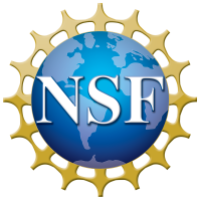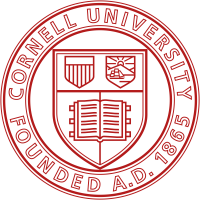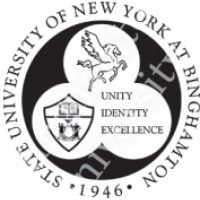April 27–28, 2019
A primary goal of the Upstate Number Theory Conference is to bring together the specialists from the various branches of Number Theory in the Upstate New York region and surrounding areas, and to expose the younger researchers to new and old problems in the field.
For those who plan to Arrive on Friday, April 26th, Kiran Kedlaya (UCSD & IAS) will be giving a colloquium talk at 4:30pm in Malott 251. (Parking information is below)
General registration is now open! Go to the following link Upstate NY Number Theory Conference to register.
Banquet registration is also required! A banquet will be held the evening of April 27th in 401/403 Physical Sciences Building. If you are interested in attending the banquet please go to https://forms.gle/KwH94zyoToZMkvDo6 to register for the banquet. Please note that the banquet is capped at 60.
Please note the important deadlines that are provided at the beginning of the general registration page.
SPEAKERS:
Abbey Bourdon, Wake Forest University
Title: Isolated Points on Modular Curves
Abstract: We say a closed point on a curve C is isolated if it does not belong to an infinite family of effective divisors of degree d parametrized by the projective line or a positive rank abelian subvariety of the Jacobian of C. In this talk, we will study the image of isolated points under morphisms, giving conditions under which the image of an isolated point remains isolated. We will explore applications of this result to the case where C is the modular curve X_1(N). This joint work with Ozlem Ejder, Yuan Liu, Frances Odumodu, and Bianca Viray extends recent results of the same authors concerning sporadic points on modular curves.
Ling Long, Louisiana State
Title: Hypergeometric Supercongruences
Abstract: In this talk, we will discuss supercongruences occurred to truncated hypergeometric series originated in the work and conjectures of Beukers and Coster. These congruences can be viewed as p-adic analogues of Hecke recursions satisfied by classical modular forms. We will present the related backgrounds under the hypergeometric umbrella and discuss approaches to supercongruences including a p-adic perturbation method proposed in a joint work with Ravi Ramakrishna. The talk will be concluded by applications and new open conjectures based on the motivic setting.
Aaron Pollack, Duke University
Title: Modular forms on G_2
Abstract: Classical modular forms are very special automorphic functions for the group GL(2), and similarly holomorphic Siegel modular forms are very special automorphic functions for the group GSp(2n). It turns out that the split exceptional group G_2, and certain forms of the other exceptional groups, possess a similar very special class of automorphic functions. These are called the 'modular forms', and their study was initiated by Gross-Wallach and Gan-Gross-Savin. I will define these modular forms on G_2 and explain what is known about them.
Arul Shankar, University of Toronto
Title: Families of elliptic curves ordered by conductor
Abstract: Conjectures on the statistics of elliptic curves are usually formulated with the assumption that the curves in question are ordered by their conductors. However, when proving results on the statistics of elliptic curves, the curves are usually ordered by (naive) height. There are two two reasons for doing so: first, it is difficult to rule out the possibility that there are many elliptic curves with small discriminant but large height. Second, it is difficult to rule out the possibility that there are many elliptic curves with large discriminant but small conductor. In this talk, we will focus on the second question, and prove some partial results bounding the number of elliptic curves whose discriminants are much larger than their heights. As consequences, we will construct positive proportion families of elliptic curves, and determine their asymptotics when they are ordered by conductor. We will also prove that the average size of their 2-Selmer groups is 3. This is joint work with Ananth Shankar and Xiaoheng Wang.
Brian Smithling, Johns Hopkins University
Title: On Shimura varieties for unitary groups
Abstract: Shimura varieties attached to unitary similitude groups are a well-studied class of PEL Shimura varieties (i.e., varieties admitting a moduli description in terms of abelian varieties endowed with a polarization, endomorphisms, and a level structure). There are also natural Shimura varieties attached to (honest) unitary groups; these lack a moduli interpretation, but they have other advantages (e.g., they give rise to interesting cycles of the sort that appear in the arithmetic Gan-Gross-Prasad conjecture). I will describe some variant Shimura varieties which enjoy good properties from both of these classes. This is joint work with M. Rapoport and W. Zhang.
Preston Wake, IAS & Michigan State
Title: Eisenstein congruences and a Bloch-Kato conjecture in tame families
Abstract: A fact made famous by Mazur is that the Galois representation associated to the modular curve X_0(11) (which is an elliptic curve) is reducible modulo 5. Less famously, the representation is also reducible modulo 25. I'll talk about this extra reducibility and what it has to do with the Bloch-Kato conjecture. This is joint work with Akshay Venkatesh.
The Complete Schedule for The Ninth Annual Upstate Number Theory Conference.
All talks and activities will be held in Malott 251, 253, 203, 207, and 224
TRAVEL: Driving directions and travel options can be found at Visit Ithaca. Cornell also operates a direct bus service from Manhattan to Ithaca (places are limited and fill up quickly).
For mobility or other accommodations, or just for general inquiries regarding the conference please send an e-mail to upstatenynt_math@cornell.edu. You will also be asked during your registration.
Organizing committee:
- Alexander Borisov, Binghamton University
- C. Douglas Haessig, University of Rochester
- Jeffrey Hatley, Union College
- Joseph Hundley, SUNY at Buffalo
- James Ricci, Daemen College
- Brian Hwang, Cornell University
- Marie MacDonald, Cornell University
- Ravi Ramakrishna, Cornell University
- David Zywina, Cornell University.
Previous conferences:
- University at Buffalo, 2018
- Binghamton University, 2017
- University of Rochester, 2016
- Cornell University, 2015
- University at Buffalo, 2014
- Binghamton University, 2013
- University of Rochester, 2012
- Cornell University, 2011
__________________________________________________________
Cornell University is committed to providing a safe, inclusive, and respectful learning, living, and working environment. To this end, Cornell will not tolerate sexual and related misconduct. Through Cornell University Policy 6.4, and the applicable procedures, the university provides means to address bias, discrimination, harassment, and sexual and related misconduct, including gender-based harassment, sexual harassment, sexual assault, domestic and dating violence, stalking, and sexual exploitation. Reports of bias, discrimination, and harassment can be made online at www.biasconcerns.cornell.edu or by contacting the Office of the University Title IX Coordinator at titleix@cornell.edu.





